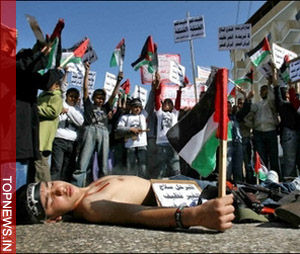Vast majority of Palestinians in Hebron live in poverty

Hebron - The Abdul Hai family numbers 56 souls, who live crammed into two small houses in the southern West Bank city of Hebron.
A combined wage of little more than 1,000 dollars a month which the three adult men in the family make together at a stone quarry in Ramallah, some 45 kilometres to the north, has to suffice for all 56 of them.
Without the food parcels they receive from the International Committee of the Red Cross (ICRC), which provide about 70 per cent of their daily needs, they would not be able to get by.
The Abdul Hai family live in "H2", the Israeli-controlled part of the divided city, where according to a recent survey conducted by the ICRC a large majority of Palestinian inhabitants live in absolute poverty, or on less than 3 dollars per person per day.
Hebron was divided into two sections under a 1997 agreement, which granted Palestinian autonomy over three quarters of the city area but left the historic centre and once very busy market area under Israeli military rule.
About 600 Jewish settlers reside in the heavily fortified and guarded Israeli-controlled enclave, where 30,000 of Hebron's 200,000 Palestinians also live.
Since September 2000 when the Palestinians rose against the Israeli occupation in what has come to be known as the second intifada (Arabic for uprising) and in response to shooting attacks by Palestinian militants, Israel has heavily restricted the entry into and movement of Palestinians inside the enclave, where soldiers man roadblocks on almost every street corner.
Many Palestinians have left for the Palestinian-controlled part of the city. Of those who remain, according to the ICRC survey, nearly 87 per cent are poor and get by on an income of 388 Israeli shekels (not much more than 100 US dollars) a month per person. Of those, the majority (nearly 72 per cent) live in absolute poverty, or on 306 Israeli shekels (some 90 dollars at the time of the survey) or less.
The ICRC conducted the survey in June on 1038 Palestinian households in Israeli-controlled H2, who make up the vast majority of the ICRC beneficiaries of the food programme in the area.
The survey also found that nearly a quarter of Palestinian men in H2 have not worked a single day in the last three months before the survey, while under three-quarters were employed as "daily workers" either in Israel or the Palestinian autonomous areas, making their income uncertain and highly vulnerable to security restrictions.
"We knew it was bad," he said, "but we were surprised to see how much worse it was," the head of the ICRC sub-delegation in Hebron, Matteo Benatti, told Deutsche Presse-Agentur dpa, adding that the survey was the first held by the ICRC since it launched the food programme eight years ago.
Christoph Harnisch, the head of the ICRC in Israel and the Palestinian areas, blamed "the severe restriction of movement in H2." "There is a direct link between the closure of H2 and the severe level of poverty, as many shop keepers have been forced to close down or move out and as people have lost steady jobs because of exhaustive security measures," he said in a statement.
"It's acceptable, better than nothing. We could use more. There are things which we need but are not included," says Ribhi Abdul Hai of the ICHR parcels, which contain basic commodities such as flour, olive oil, sugar and tinned fish, as well as hygiene items such as soap, detergent and children's nappies.
His family has been relying on the ICRC aid for the past five years, adds the 42-year-old, who shares the two rundown houses in H2's Wadi al-Hussein neighbourhood with his five brothers, their wives and children, his three unmarried sisters and his parents.
The Abdul Hai brothers share their jobs at the Ramallah stone quarry between the six of them.
"Three of us got out to work and three stay home because there is always trouble in this area," says Ribhi, referring to violent clashes with stone-throwing settlers from the settlement of Qiryat Arba, which borders on his neighbourhood and which he says has, since its establishment in 1968, expanded several hundred metres onto land owned by his family.
As part of the food programme, the ICRC also gave his family a herd of some 15 sheep, but about one third has died because, Ribhi explains, his family are workers, not farmers, and do not know how to care for them. The sheep also cost more than they yield, and a small barn they built without a permit to house them was ordered by the Israeli army to be demolished.
Their front yard, where the family sits, is covered with a metal shield to prevent rocks thrown from the settlement up the hill from falling on their heads. dpa